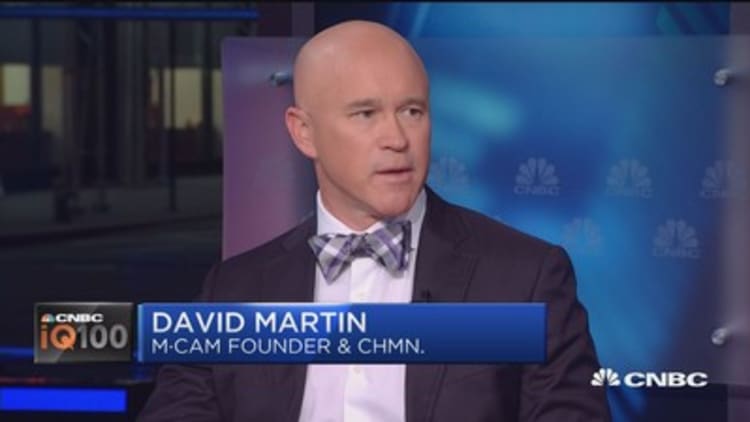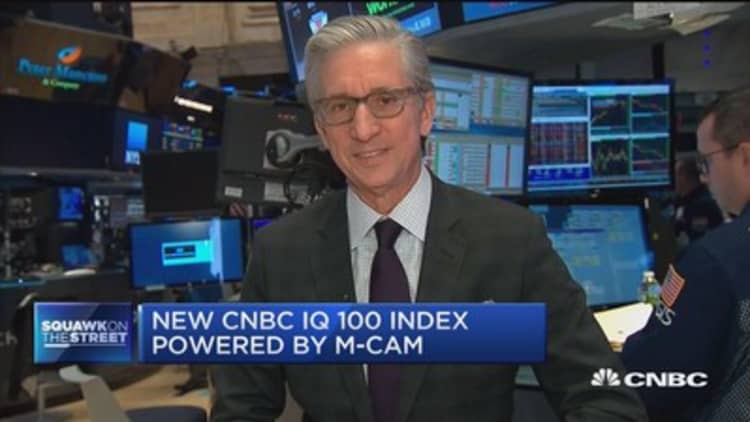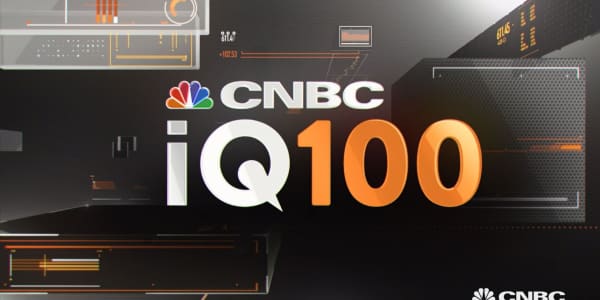
Today CNBC unveils the CNBC IQ100 Index, a first-of-its-kind rules-based index of large-cap companies that derive substantial revenue growth through the use of protected, proprietary technology. It is powered by MCAM-International, a firm that maintains an unprecedented archive of documents related to patents, trademarks, copyrights and other intangible assets from 160 countries. A mix of MCAM's proprietary algorithms comb the documents for relevant criteria and select the 100 index components. According to guidelines set by CNBC's editorial team, at least 90 percent of index components must be selected from the Russell 1000 universe, while up to 10 percent may come from a mix of high-scoring international companies that trade in the United States as American Depository Receipts (ADRs), small-cap and mid-cap companies.
The companies in the index are weighted according to each one's ability to invest in, develop, control and deploy intellectual property to achieve strategic advantage over competitors. Companies with the highest weighting maintain this type of advantage across multiple industries.
Johnson & Johnson is the highest-weighted stock in the index this quarter, followed by AMD and Amazon.
While J&J may not be the first company anyone thinks of when they hear the word "innovation," the 130-year-old company is on the leading edge of everything — from baby shampoo to biosurgery. It has a history of continuously developing new products and reinventing existing ones to grow its margins.
J&J spent more than $9.2 billion on R&D in 2015, or more than 13 percent of total revenues. (Compare that to Apple, which spent about $8 billion, or just 8 percent of total revenues on R&D.) According to J&J's annual report, new products introduced in the last five years accounted for approximately 25 percent of 2015 revenue. And it attributed operational growth to new product launches in five different units of the company: baby care, oral care, surgery, vision care and women's health.

The CNBC IQ100 helps prove that executives who invest time, money and human capital toward improving core competencies can deliver more value to customers, employees and shareholders. Despite surging stock buybacks and intense quarterly earnings pressure in today's business landscape, companies that focus on material innovations protected with proprietary rights win over the long term.
The real proof is in the performance: In an analysis done by MCAM, the CNBC IQ100 outperformed the by an average of 5 percent going back to 2007.
The IQ100 is entirely rules-based. There is no committee, and therefore no human bias. The index will be reweighted quarterly and reconfigured once per year. Unlike the Dow Jones Industrial Average and the S&P 500, stock price and market capitalization are not factors in determining index weighting.
Today the 120-year-old Dow Jones Industrial Average stock index, composed of 30 large-cap stocks, is used by many economists to gauge the performance of the U.S. economy. However, most market watchers know the Dow is statistically flawed and suffers from outdated methodology and fails to fully account for how innovation drives U.S. economic growth.
Take the case of Apple, which wasn't added to the Dow until March 2015. It was the world's richest company long before then, but it couldn't be added to the Dow, because the stock price was too high and could therefore skew the index. It took a 7-to-1 stock split of its own — and a coincidental stock split by Visa, another Dow component — to allow the committee that manages the Dow and other indexes to consider adding Apple.
Technology and America's transition from a manufacturing-based to a services-based society has made the economy more complex and corporate growth harder to measure. Companies know how to value tangible assets like inventory and equipment, but there is no standard method for valuing intangibles like software patents and brand equity. The real drivers of margin growth, and in turn the sources of economic and employment growth, are hidden. The IQ100 is designed to find them and determine which companies benefit the most from the new market opportunities they identify, pursue, control and protect.
Much more about the CNBC IQ100 can be found in the white paper written by MCAM, which lays out the methodology in detail and outlines the results of the back-tested performance.
Correction: A previous version of this story characterized the universe of stocks from which the CNBC IQ 100 are selected as exclusive to the Russell 1000. Complete details regarding the selection process can be found here.





